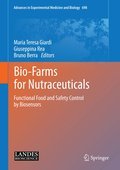
Bio-farms for nutraceuticals: functional food and safety control by biosensors
Giardi, Maria Teresa
Rea, Giuseppina
Berra, Bruno
'Bio-Farms for Nutraceuticals' can be said to have been born of the NUTRA-SNACKS project within the Sixth Framework Programme Priority on Food Quality and Safety. One objective of NUTRA -SNACK S was to improve the nutritional and eating properties of ready-to-eat products and semi-prepared foodstuffs through better monitoring of the quality and safety of raw materials and the development of innovative processes along the production chain. Another main objective of the project was the production of ready-to-eat snacks with high nutraceutic activity. Seven research institutes and three companies in six European countries were involved in this effort. The co-operation resulted in the production of food having a high content of natural metabolites with the following beneficial health effects: anticancer, antilipidemic, anticholesterol, antimicrobial, antibacterial, antifungal, antiviral, antihypertensive, anti-inflamatory andantioxidant activities. Describes the efficacy and safety of some medicinal, nutraceutic herbs and plants Methods to enhance the quantity of phytonutrientsDeals with testing the safety and quality of nutraceutics using both classical and new research methodologies and technologies INDICE: The Nutra?Snacks Project: Basic Research and Biotechnological Programs on Nutraceutics.- Overview of Diet?Gene Interactions and the Example of Xanthophylls.- Therapeutic Potential of Dietary Polyphenols against Brain Ageing and Neurodegenerative Disorders.- Plant Phenolics in the Prevention and Treatment of Cancer.- Endogenous Antioxidants and Radical Scavengers.- A Nutritional Strategy for Reducing Disease and Obesity Risks.- Dietary Phytochemicals and Human Health.- Bioactive Compounds from Northern Plants.- Nutraceutical Use of Garlic Sulfur?Containing Compounds.- Genetic Engineering to Enhance Crop?Based Phytonutrients (Nutraceuticals) to Alleviate Diet?Related Diseases.- Perspective for the Use of Genetic Transformants in Order to Enhance the Synthesis of the Desired Metabolites: Engineering Chloroplasts of Microalgae for the Production of Bioactive Compounds.- Biological Elicitors of Plant Secondary Metabolites: Mode of Action and Use in the Production of Nutraceutics.- Hairy Root Cultures for Secondary Metabolites Production.- Plant Tissue Culture—An Opportunity for the Production of Nutraceuticals.- Plant Cell Cultures: Bioreactors for Industrial Production.- Determination of the Antioxidants’ Ability to Scavenge Free Radicals Using Biosensors.- Biosensors for the Determination of Phenolic Metabolites.- Methods for the Determination of Antioxidant Capacity in Food and Raw Materials.- Analytical Methods for the Extraction and Identification of Secondary Metabolite Production in ‘In Vitro’ Plant Cell Cultures.- Biosensors for Functional Food Safety and Analysis.- Biosensors for Secondary Metabolites, Two Case Studies: Ochratoxin A and Microcystin.- Biosensors as Analytical Tools in Food Fermentation Industry.- An Overview of the Functional Food Market: From Marketing Issues and Commercial Players to Future Demand from Lifein Space.- Legislation on Nutraceuticals and Food Supplements A Comparison between Regulations in USA and EU.
- ISBN: 978-1-4419-7346-7
- Editorial: Springer
- Encuadernacion: Cartoné
- Páginas: 332
- Fecha Publicación: 27/10/2010
- Nº Volúmenes: 1
- Idioma: Inglés
